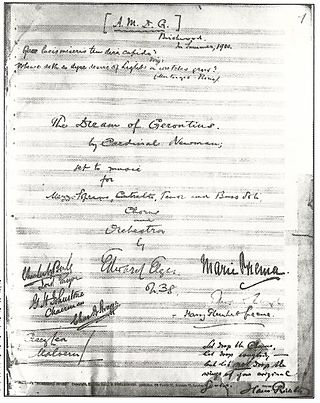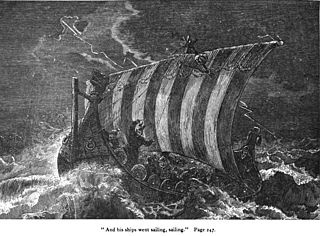Related Research Articles

Sir Edward William Elgar, 1st Baronet, was an English composer, many of whose works have entered the British and international classical concert repertoire. Among his best-known compositions are orchestral works including the Enigma Variations, the Pomp and Circumstance Marches, concertos for violin and cello, and two symphonies. He also composed choral works, including The Dream of Gerontius, chamber music and songs. He was appointed Master of the King's Musick in 1924.
An oratorio is a large musical composition for orchestra, choir, and soloists. Like most operas, an oratorio includes the use of a choir, soloists, an instrumental ensemble, various distinguishable characters, and arias. However, opera is musical theatre, while oratorio is strictly a concert piece – though oratorios are sometimes staged as operas, and operas are sometimes presented in concert form. In an oratorio, the choir often plays a central role, and there is generally little or no interaction between the characters, and no props or elaborate costumes. A particularly important difference is in the typical subject matter of the text. Opera tends to deal with history and mythology, including age-old devices of romance, deception, and murder, whereas the plot of an oratorio often deals with sacred topics, making it appropriate for performance in the church. Catholic composers looked to the lives of saints and histories from the Bible while Protestant composers only to Biblical topics. Oratorios became extremely popular in early 17th-century Italy partly because of the success of opera and the Catholic Church's prohibition of spectacles during Lent. Oratorios became the main choice of music during that period for opera audiences.

Elijah, Op. 70, MWV A 25, is an oratorio by Felix Mendelssohn depicting events in the life of the Prophet Elijah as told in the books 1 Kings and 2 Kings of the Old Testament. It premiered on 26 August 1846.

The Birmingham Triennial Musical Festival, in Birmingham, England, founded in 1784, was the longest-running classical music festival of its kind. It last took place in 1912.

The Dream of Gerontius, Op. 38, is a work for voices and orchestra in two parts composed by Edward Elgar in 1900, to text from the poem by John Henry Newman. It relates the journey of a pious man's soul from his deathbed to his judgment before God and settling into Purgatory. Elgar disapproved of the use of the term "oratorio" for the work, though his wishes are not always followed. The piece is widely regarded as Elgar's finest choral work, and some consider it his masterpiece.
The Music Makers, Op. 69, is a work for contralto or mezzo-soprano, chorus and orchestra composed by Edward Elgar. It was dedicated to "my friend Nicholas Kilburn". It was first performed at the Birmingham Festival on 1 October 1912, conducted by the composer, with Muriel Foster as the soloist.
The Apostles, Op. 49, is an oratorio for soloists, chorus and orchestra composed by Edward Elgar. It was first performed on 14 October 1903 at the Birmingham Music Festival.

Sir Alfred Herbert Brewer was an English composer and organist. As organist of Gloucester Cathedral from 1896 until his death, he contributed a good deal to the Three Choirs Festival for 30 years.

John Pierre Herman Joubert was a British composer of South African birth, particularly of choral works. He lived in Moseley, a suburb of Birmingham, England, for over 50 years. A music academic in the universities of Hull and Birmingham for 36 years, Joubert took early retirement in 1986 to concentrate on composing and remained active into his eighties. Though perhaps best known for his choral music, particularly the carols Torches and There is No Rose of Such Virtue and the anthem O Lorde, the Maker of Al Thing, Joubert composed over 160 works including three symphonies, four concertos and seven operas.

August Johannes Jaeger was an Anglo-German music publisher, who developed a close friendship with the English composer Edward Elgar. He offered advice and help to Elgar and is immortalised in the Enigma Variations.

Frederic William Austin was an English baritone singer, a musical teacher and composer in the period 1905–30. He is best remembered for his restoration and production of The Beggar's Opera by John Gay and Johann Christoph Pepusch, its sequel, Polly, in 1920–23, and for his popularization of the melody of the carol The Twelve Days of Christmas. Austin was the older brother of the composer Ernest Austin (1874–1947).
The Black Knight, Op. 25 is a symphony/cantata for orchestra and chorus written by Edward Elgar in 1889–93. The librettist borrows from Longfellow's translation of the ballad Der schwarze Ritter by Ludwig Uhland.
Saint Peter's Singers (SPS) is a chamber choir associated with Leeds Minster, Leeds, West Yorkshire, England that celebrated during the Season 2017/2018 the fortieth anniversary of the choir's formation by Harry Fearnley in 1977. An anniversary concert took place at Leeds Minster on Sunday 25 June 2017 with the National Festival Orchestra and soloists Kristina James, Joanna Gamble, Paul Dutton and Quentin Brown. Further anniversary year events included Bach Cantatas and Music for Christmas at Fulneck Church in August and December respectively, Handel Coronation Anthems at Holy Trinity, Boar Lane as part of the Leeds Handel Festival in September and a tour of East Anglia in October. In November at Leeds Town Hall, the Singers participated in Herbert Howells's masterpiece Hymnus Paradisi with Leeds Philharmonic Chorus and Leeds College of Music Chorale under the direction of Dr David Hill with the Orchestra of Opera North. 2018 began with a concert of Sacred Choral Masterworks at Leeds Town Hall in February and Bach's Mass in B minor at Leeds Minster on Good Friday 2018 in memory of long-serving member Jan Holdstock. The final concert of the current season takes place at Leeds Minster on Sunday 24 June at Leeds Minster at 5.30. At this event will be presented the first performance of a new work from composer Philip Moore commissioned for the Singers' 40th anniversary – the motet Tu es Petrus – along with music by E W Naylor, Arvo Part, Sir Hubert Parry, Judith Bingham and Maurice Durufle.

Derby Choral Union is one of the UK’s longest standing choral societies having been formed in 1866. The choir was established to perform choral music of the highest quality, a tradition it strives to maintain to this day. The repertoire includes traditional choral works as well as music by 20th-century and more contemporary composers. Derby Choral Union is a registered charity and an independent choral society. It promotes concerts in Derby, England, and the surrounding district, and has over 100 active members.

The Song of Hiawatha, Op. 30, is a trilogy of cantatas written by Samuel Coleridge-Taylor between 1898 and 1900. The first part, Hiawatha's Wedding Feast, was particularly famous for many years and made the composer's name known throughout the world.

Julius Buths was a German pianist, conductor and minor composer. He was particularly notable in his early championing of the works of Edward Elgar in Germany. He conducted the continental European premieres of both the Enigma Variations and The Dream of Gerontius. He also had notable associations with Frederick Delius and Gustav Mahler.

Herbert Heyner was a noted English baritone. Heyner appeared in a handful of operas, and a number of broadcast operas, but his stage appearances were predominantly in oratorio and songs. He sang in some notable performances of Sir Edward Elgar's oratorios under the composer's baton. He sang in Britain, France, Germany, the United States and Canada, and he sang at The Proms 59 times between 1909 and 1937, in songs and operatic arias.
This is a summary of 1906 in music in the United Kingdom.
La Rédemption is an oratorio in three parts by Charles Gounod arranged for the first time in 1882.

King Olaf is a cantata by British composer Edward Elgar scored for soloists, chorus and orchestra. It was commissioned for the North Staffordshire Music Festival of 1896, where it was well received. It went on to be performed by choral societies in other parts of the country.
References
- Much of the information in this article can be found in: Kennedy, Michael. Portrait of Elgar. Oxford: Clarendon Press.
- Csizmadia, Florian (2017). Leitmotivik und verwandte Techniken in den Chorwerken von Edward Elgar. Analysen und Kontexte. Berlin: Verlag Dr. Köster. ISBN 9783895749032.